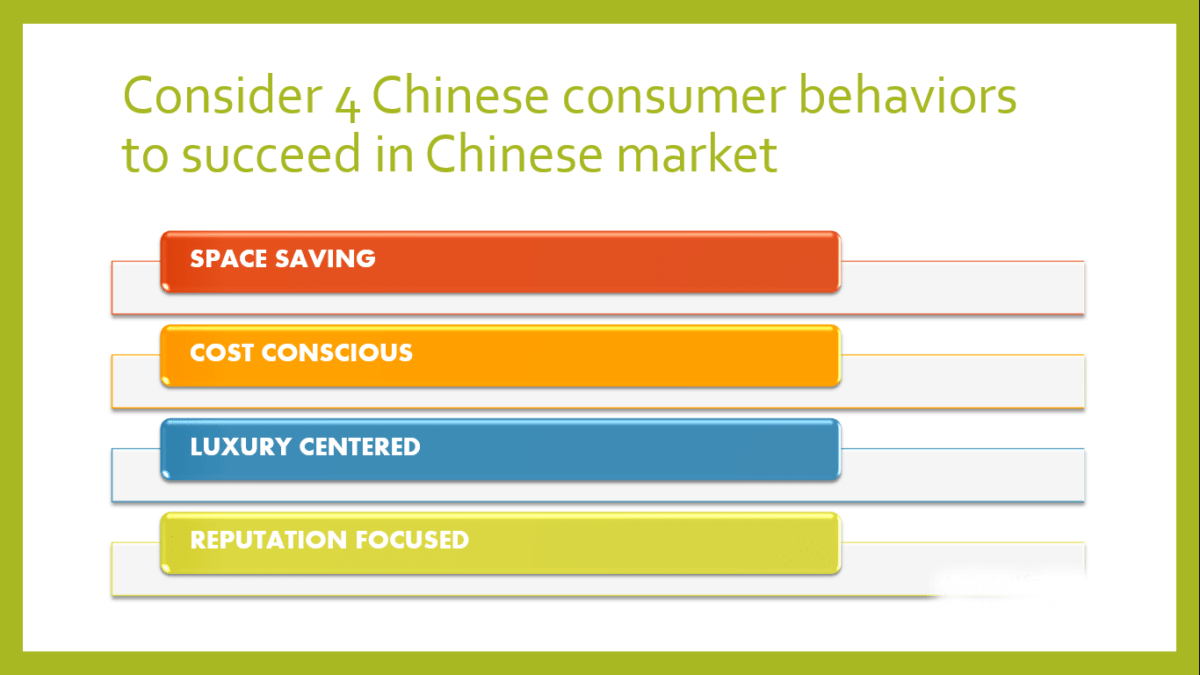Four common ways Chinese consumers behave
Chinese consumers prioritize quality and value over affordability, whereas American and British consumer prioritize affordability. If you are thinking about dealing with the Chinese market, you should consider the following four behaviors:
1. SPACE SAVING CONSUMERS
- People often consider all their options in China before purchasing a product or service.
- China’s limited living space is partly responsible for this buying behavior. In a country where personal storage space is limited, Chinese consumers must have good reasons for buying new things.
- To market Chinese consumers effectively, you need to reach them at every step of their purchasing journey, and convince them that your brand is the best one to invest in.
2. COST CONSCIOUS CONSUMERS
- An economic history of struggles has resulted in a lack of disposable income and a culture where the costs of living have been considered paramount. Millennials are a perfect example. The median income among younger workers is $100 to $500 a month. Despite this, the Chinese preference for value over price wins out. This has directly benefited easy access stores and fast-food restaurants, such as MacDonald’s and Walmart.
- Despite continued high spending on home improvements, TVs, and luxury goods, many people still opt to dwell in substandard houses. Chinese consumers would rather buy fewer, higher quality products when they have less money, and a careful purchasing decision process. Their shopping behavior is based on comparison shopping, earning savings by going out less, and saving money.
3. BRAND CONSCIOUS CONSUMERS
- Consumers in China are an extremely quality-conscious society, and as a result they tend to buy luxury goods. Luxury brands will find China to be both a high-revenue market and a highly lucrative one for them.
- Only this market generates roughly 25% of global sales for brands including Bulgari, Salvatore Ferragamo, and Gucci. While Louis Vuitton earns half its profits in the Chinese market, it has 60 locations that can take in up to 7 percent of its global sales.
- If you market to Chinese consumers, regardless of your price point, you are either an aspirational or a luxury brand. Put your brand value in front of your price point instead. Convince consumers that you are worth the cost by appealing to their heritage and superior quality.
4. REPUTATION FOCUSED CONSUMERS
- The Chinese have a strong sense of honor and reputation, which makes both representations in their brands essential for success in the current market. Chinese consumers are very sensitive to opinions about products and ethics, and they could lose trust in your company due to negative remarks. In fact, consumers only find other users’ opinions of products to be more trustworthy than expert opinion in China. Trust and engagement are built on user reviews and testimonials.
- Even product or store launches can be influenced by consumer sentiment. In China, 88% of consumers said they would be interested in what is going on in a queue when asked about their reaction to such a sight, 60% of whom tend to stop to inquire and 3% of whom are willing to join a line without knowing why.
- Search engines are also trusted in China, as online verification is very high. Optimal results for search marketing campaigns in China will only result from an effective content strategy.

